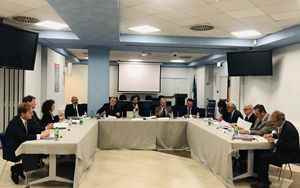(Finance) – “Pandemic and Russia’s military aggression against Ukraine are generating complications for all supply systems: from raw materials, to semiconductors, to chips, to energy. point of the situation and determine what actions to take to overcome this difficult historical moment “. That’s what he said Lucio Miranda, president of ExportUSA on the occasion ofmeeting “Towards a more sustainable supply chain: new paths for critical infrastructures”. The initiative, organized by the ExportUSA company at the headquarters of the Commission representation and the European Parliament, in collaboration with ‘Formiche’, brought together experts from the business and institutional world from both sides of the Atlantic and from the Balkans. A first meeting, which will be followed by technical and operational meetings where concrete proposals will be defined, to help institutions and define new actions capable of helping companies to overcome the criticalities caused by a supply chain that is too distant.
“The context and the regulatory structure to overcome the problems related to the Supply Chain already exists: there is no need to invent the wheel. It would be enough to insert yourself in the Report on the state of the supply chain published by the White House on February 24, 2022, within which the main federal agencies have identified the product categories for which there is a criticality in the American market Miranda – that within the report drawn up by the White House, the orientation of the Biden Administration is to overcome offshoring by aiming at friend-shoring, thus looking to Europe and Japan. Therefore, all the conditions exist to deepen the dialogue with the United States in a concrete way, presenting the Italian companies active in the product categories concerned. Despite the strengthening of the ‘Buy American’ carried out by Biden, the spaces are there, but we need an engagement at an institutional level that is aware, decisive and possibly even fast “.
To ensure better and safer transatlantic cooperation, the European Commission has introduced the “Trade and Technology Council” tool. “An important platform that – he explained Antonio Parenti, representative of the European Commission in Italy – is aimed at representing the needs of European companies in terms of technologies, but also of the supply chain “.
Among the speakers, companies of the caliber of Bonfiglioli Riduttori and Maserati who underlined the need to change approach to face the emergency.
“Italy is at risk of being damaged more than other countries. Emerging phenomena such as the transition to the electric car – he said. Sonia Bonfiglioli, president of the Bonfiglioli Group – they can have negative repercussions on the Italian economy: electric cars need less manpower to be built. In Germany, car companies do not fire: they are moving, rather, towards production integration models where the choice between ‘make’ or ‘buy’ is shifting from ‘buy’ to ‘make’ thus reducing dependence on foreign supplies. The supply crisis is spreading, gradually also to energy. The higher incidence of the cost of energy in Italy (+ 82.3%) compared to Germany (+ 17.6%) and France (+ 6%), also penalizes us compared to other European countries. Italian companies pay 60 euros per megawatt hour more than German companies. Encouraging greater energy autonomy of companies by resorting to consolidated solutions such as photovoltaics (roofs and parking lots) for the companies themselves can be a solution that reduces costs “.
“The car is a very complex product, made up of thousands of different parts that require an equally complex logistics chain. For these reasons, – he stressed. Luca Delfino, head of Maserati Emea – the supply chain problem affects the automotive industry very closely. Furthermore, the shift towards electric is generating new challenges. The shortage of semiconductors is a new variable. In order to ensure stability in the supply of chips, Maserati is moving even more towards a custom made model where “prompt delivery” is not a competitive factor. We are part of Stellantis and therefore we can benefit from agreements made by the Group with chip manufacturers to ensure the stability of supplies “.
As pointed out Paolo Glisenti, general commissioner of Italy at Expo Dubai “the game of 30% of Italian exports is played
in the Middle East, South East Asia, North Africa “. For Glisenti, the signal left by Expo Dubai is clear:” with the United Arab Emirates our trade has increased from 5 to 10 billion euros in just 3 years, from before pandemic to today’s Russia-Ukraine war. This area of the world is the frontier of change “.
He intervened on the issue of sanctions John Shoening, American attorney, expert in Customs Law. “Companies must understand that customs regulations are proliferating and pay attention to the increased risk of sanctions. For example, a garment produced even partially with cotton that comes from the Chinese UIGUR region – explained Shoening – can be stopped at American customs until the company does not prove that the cotton was produced without using ‘slave labor’. Without prior planning, documentary proof becomes impossible. The same applies to punitive duties: if my product includes components subject to specific duties, the risk is that of a significant and unexpected increase in import costs “.
“In the current scenario – he added Fatmir Mediu, former Albanian Minister of Defense – the role of China should also be remembered. China is filling the void left by sanctions against Russia and is actually helping it to continue its policy. Let’s remember what happened in 2018 regarding 5G with Huawei and the role of China in sniffing the data that moved on Huawei’s 5G network “.
Since Green deals and decarbonisation policies require raw materials and materials to be implemented, Corrado Clini, former Minister for the Environment, highlighted how “the supply crisis risks slowing down the transition to a sustainable economy and delaying the implementation of European programs by governments. Let us remember – concluded Clini – that there can be no successful decarbonisation policies without participation of China and India.
